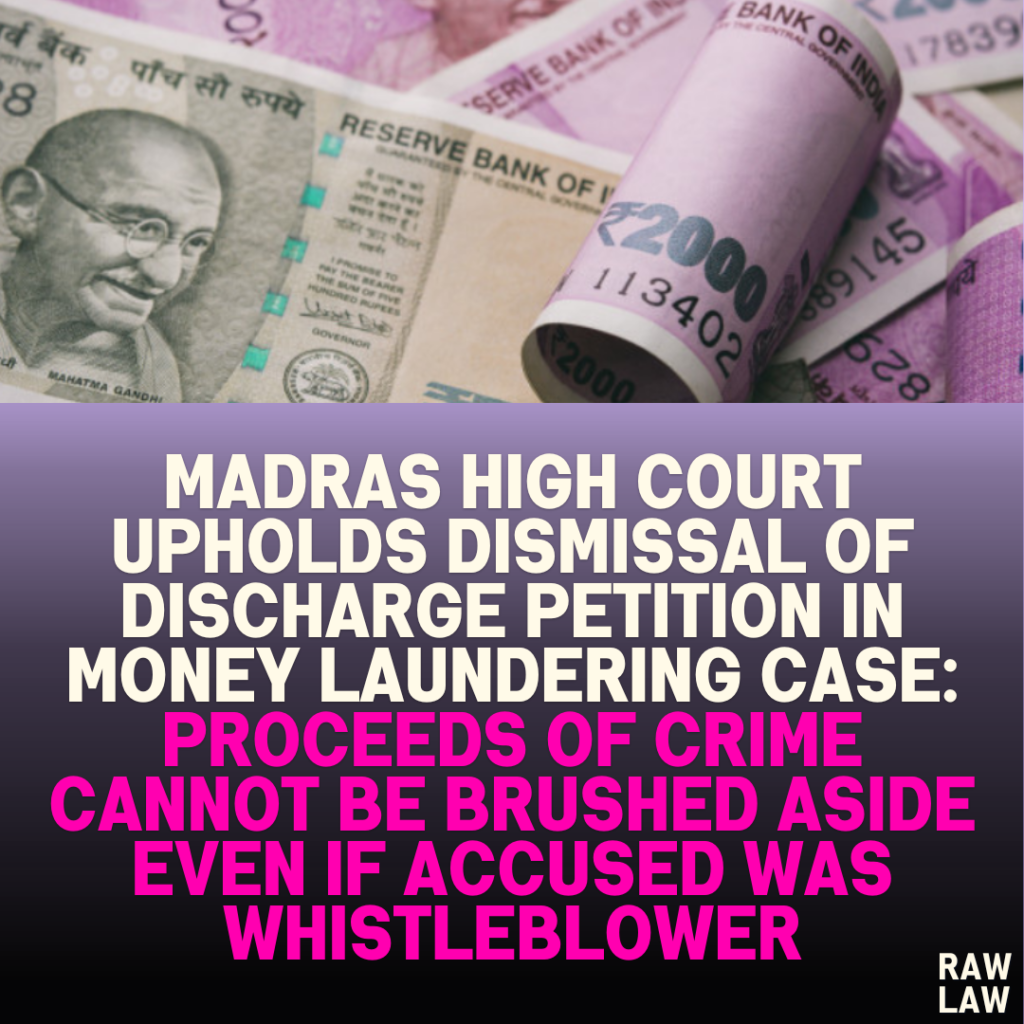Court’s Decision
The Madras High Court dismissed the Criminal Revision Petition filed by the petitioners challenging the rejection of their discharge petition under Section 239 of the Criminal Procedure Code. The court upheld the Special Court’s decision, stating that there was a prima facie case against the petitioners under the Prevention of Money Laundering Act (PMLA), 2002. The court emphasized that the materials available on record were sufficient to support the charges against the petitioners for money laundering offenses under Section 3 and punishable under Section 4 of PMLA.
Facts
The case pertains to the allegations of money laundering involving a company and its directors. A tripartite agreement was entered into on 13.02.2008 between the accused and a third party, whereby the possession and shareholding of a company were transferred. It was alleged that the funds received through this transaction were involved in criminal activities, which were later utilized to purchase machinery and transferred to another entity controlled by the petitioners. An FIR was registered on 23.07.2009, accusing the main conspirator (A1) of various offenses under the Indian Penal Code, including criminal conspiracy, forgery, and criminal breach of trust.
The investigation by the Central Bureau of Investigation (CBI) led to the filing of a chargesheet on 28.11.2011 for the offenses under IPC Sections 120B and 420, as well as Sections 13(2) read with 13(1)(a) and (d) of the Prevention of Corruption Act. Subsequently, the Enforcement Directorate (ED) initiated proceedings under PMLA, contending that the accused had engaged in money laundering through the diversion of proceeds of crime.
Issues
- Whether the petitioners could be held liable under the PMLA when they were initially not named in the predicate offense chargesheet.
- Whether there was a prima facie case against the petitioners under the PMLA.
- Whether the involvement of the petitioners in the activities of the company constituted knowledge and participation in money laundering.
Petitioner’s Arguments
The petitioners argued that they were initially whistleblowers who exposed the misappropriation of funds by the main conspirator. They contended that the 1st petitioner, upon noticing irregularities, filed a complaint against the primary accused (A1). The petitioners further argued that they were not implicated in the original FIR or chargesheet filed by the CBI. It was only in the supplementary complaint filed in 2021 that they were named as Accused Nos. 8 and 14. The petitioners claimed that the discharge petition should have been allowed as there was no prima facie case against them.
Respondent’s Arguments
The Enforcement Directorate argued that the petitioners were actively involved in laundering the proceeds of crime through the entities they controlled. The respondent contended that the investigation revealed that the accused had knowledge of the criminal activities and had assisted in concealing and projecting the proceeds of crime as untainted property. The respondent relied on the statements recorded under Section 50 of PMLA, where the petitioners admitted to being aware of the diversion of funds.
Analysis of the Law
The court analyzed the provisions of Section 3 of PMLA, which defines the offense of money laundering, and Section 4, which prescribes punishment. The court observed that even if a person was not named in the predicate offense, they could still be prosecuted under PMLA if they were found to be in possession or were involved in the process of laundering the proceeds of crime. The court referred to the definition of “proceeds of crime” under Section 2(u) of PMLA and concluded that the petitioners had a prima facie role in dealing with such proceeds.
Precedent Analysis
The court referred to the case of V.M. Ganesan vs. Directorate of Enforcement, where it was held that the mere fact that a person was not accused in the predicate offense does not absolve them from being prosecuted under PMLA. The court also referred to the principles laid down in State of Tamil Nadu vs. R. Soundirarasu and Sanjay Kumar Rai vs. State of Uttar Pradesh, emphasizing that the threshold for discharge under Section 239 Cr.P.C. is whether there is a ground for presuming the accused has committed an offense.
Court’s Reasoning
The court reasoned that the petitioners’ contention that they were whistleblowers did not hold, as the investigation revealed that they were involved in concealing the proceeds of crime. The court highlighted that the petitioner’s role in facilitating the investments and their subsequent attempts to project the proceeds as legitimate constituted a prima facie case under the PMLA. The statements made by the petitioners under Section 50 of PMLA and the supplementary complaint formed a strong basis for denying the discharge.
Conclusion
The court concluded that there was sufficient material to proceed against the petitioners for trial under the PMLA. The findings of the Special Court were upheld, and the revision petition was dismissed. The court reiterated that the petitioners must face trial to establish their innocence.
Implications
The decision underscores that even if a person is not directly named in the original chargesheet, their subsequent involvement in laundering the proceeds of crime can attract prosecution under PMLA. The judgment affirms the broad scope of PMLA in targeting individuals who knowingly assist or conceal criminal proceeds, thereby strengthening the enforcement of anti-money laundering laws.




Pingback: Delhi High Court Dismisses 35-Year-Old Plea for Second Chance Allotment: “Plot Was Cancelled Due to Non-Payment, No Legal Challenge Since 1978 Negates Reconsideration” — “Law Does Not Help Those Who Sleep Over Their Rights” - Raw Law